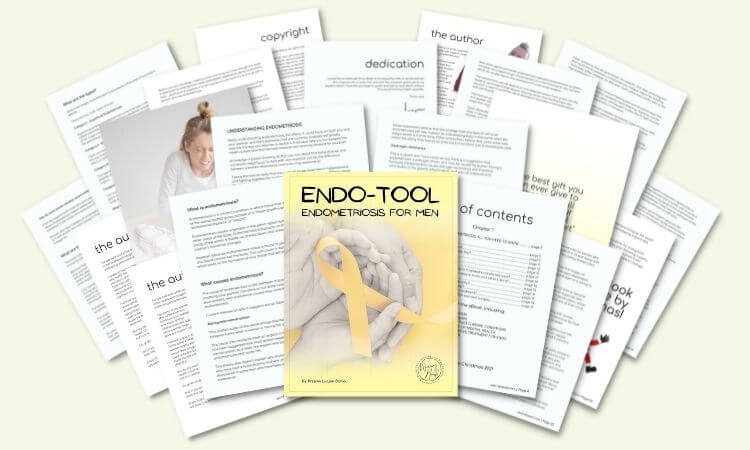How do you care for someone with endometriosis?
There is no one easy answer to this question, as each person’s experience with endometriosis is unique. However, there are some general things you can do to care for someone with endometriosis in the best way possible.
First and foremost, it is important to be understanding and patient. Endometriosis can be a very painful and debilitating condition, and your loved one may not always be able to do the things they want or need to do. Offer help and assistance where you can, but also give them space when they need it.
It is also important to educate yourself about endometriosis. This way, you will be better equipped to understand what your loved one is going through and how you can best support them. There are many excellent resources available. One of the best ones is on this very blog.
Finally, be there for your loved one emotionally. Endometriosis can be a very hard thing to deal with, both physically and emotionally. Offer a shoulder to cry on, an ear to listen, and words of encouragement. Sometimes just knowing that someone cares can make all the difference.
Being a husband of someone who suffers from stage IV deep infiltrating endometriosis, I’ve learned over a decade of our marriage what works and what doesn’t. In this article, I am going to go beyond the general knowledge and give provide you with plenty of tips.
How can a man care for a chronically ill woman?
The first thing you need to understand is that your partner is not lazy. She doesn’t want to spend all day in bed, but her body is betraying her. When she has a flare-up, it can be impossible for her to do anything other than lie in a dark room and hope the pain goes away.
Feeling useless when you care for someone with endometriosis is very understanding, so here’s my advice:
- Educate yourself about endometriosis
- Be understanding and patient
- Communicate with her
- Offer emotional support
- Do things around the house to help out
- Understand that she is not lazy
- Don’t push her to do more than she can handle
- Be her advocate
- Seek professional help if needed
Educate yourself about endometriosis.
Endometriosis takes a toll on women’s mental health, I found out about it firsthand.
Endometriosis is a chronic and often painful condition that affects 10 percent of women of reproductive age. The disorder occurs when tissue that is similar to the one that lines the uterus grows outside of it, causing pain, heavy bleeding, and other symptoms.
A new study published in the journal JAMA Psychiatry found that endometriosis takes a significant toll on women’s mental health. Researchers analyzed data from more than 46,000 women in the U.K. and found that those with endometriosis were nearly twice as likely to experience anxiety and depression as those without the condition.
The findings highlight the need for better mental health care for women with endometriosis. If you are struggling with endometriosis, please know that you are not alone and there is help available. Talk to your doctor about your symptoms and ask for a referral to a mental health professional who can provide support and treatment.
My wife has me. I offer her daily emotional support. She suffers from anxiety over the unknown future, depression due to the loss of her health, and Obsessive-Compulsive Disorder trying to find some sense of control over her situation.
For the person who cares for their chronically ill partner can be hard to understand how mental health is linked to this condition. How do you care for someone with endometriosis if you don’t suffer from it yourself, especially, if you are a man?
Education is the key when you care for someone with endometriosis. There are many wonderful sources for those who suffer from this condition, but not enough for those who support them.
Being a man, I found it hard at the beginning to spell the word “endometriosis”, let alone understand it. But I have never given up on my wife. April 2022 marked 10 years of my marriage to a beautiful Italian woman who suffers from endometriosis and fibromyalgia.
I went beyond my own education about her conditions, I started a blog in order to help men in a similar situation to mine understand endometriosis, their role of support & how to cope with their partner’s illness. Furthermore, I wrote a book about it called “Endo-Tool: Endometriosis for Men”.
If you want to learn more about endometriosis, you can get a FREE 1st chapter containing all you need to know about this chronic condition, plus how to cope and support your partner. This freebie includes:
- What is endometriosis?
- What are the symptoms?
- What causes endometriosis?
- What does endometriosis look like?
- What are the stages?
- What are the types?
- What is adenomyosis and how is it related to endometriosis?
- Why do some women develop severe endo and others don’t?
- Does endometriosis cause infertility?
- How is endometriosis diagnosed?
- Do types and stages affect the treatment?
- Recurrence of endometriosis after excision surgery.
FREE Chapter of “Endo-Tool”!
an Endometriosis for Men book

Be understanding and patient.
This can be a difficult and painful time for her. Help her to find the resources she needs to cope with this chronic condition. Most women with endometriosis have mild to moderate symptoms, but some women may experience severe pain and other complications.
There is no cure for endometriosis, but there are treatments that can help relieve symptoms and improve quality of life. Be understanding and patient with your loved one. Let her know that you care and are here for her.
Chronic illness can be unpredictable and frustrating, and it is important to have patience with each other during the good times and the bad. Remember that your partner is likely doing the best they can, and try to avoid placing blame or getting angry over small things.
Make an effort to learn how it affects your loved one. This will help you to be more understanding and patient…
- Listen to your loved one when she talks about her symptoms and how they affect her.
- Validate her feelings and let her know that you understand how she is feeling.
- Encourage her to talk to her doctor about her symptoms and treatment options.
- Be patient with your loved one as she copes with this chronic condition.
Communicate with her.
It can be difficult to maintain open communication in any relationship, but it is especially important when one partner is dealing with a chronic illness like endometriosis. Here are a few tips to help you keep the lines of communication open by being honest about your needs and feelings.
Endometriosis can be a very painful and disruptive condition, and it is important, to be honest with your partner about how it is affecting you. This includes being honest about your pain levels, fatigue, mood swings, and any other symptoms you may be experiencing, but it is also important to communicate your needs in terms of support and understanding.
Make time for each other. It can be difficult to find time for each other when you are dealing with the demands of a chronic illness, but it is important to make the effort. Schedule regular date nights or weekend getaways, even if it means canceling plans at the last minute due to a flare-up.

Offer emotional support.
Giving emotional support to a partner with endometriosis can be difficult at times. You might feel like you need to be their caretaker and that can be tough to handle.
One of the most important things in any relationship is emotional support. This is when we feel safe to express our emotions to our partners, and know that they will respond in a way that is supportive and understanding. Emotional support can be given in many different ways, but it is often the little things that mean the most. Just being there for someone when they need you, listening to them, and being understanding can make all the difference.
If you are feeling unsupported in your relationship, it is important to communicate this to your partner. They may not be aware of how you are feeling, so it is up to you to let them know. It is also important to remember that we all have different ways of showing and receiving emotional support, so what works for one person may not work for another.
If you are unsure of what your partner needs, ask them directly. They will appreciate your efforts to try and understand them, and it will help to build a stronger connection between you.
If your partner is dealing with anxiety or depression, it can be difficult to know how to best support them. It is important to remember that everyone experiences these conditions differently, so what works for one person may not work for another. However, there are some general things that you can do to help.
The most important thing is to be there for your partner. If you care for someone with endometriosis, you need to listen to them when they want to talk, and try to understand how they are feeling. Offer reassurance and support, and let them know that you are there for them no matter what.
It can also be helpful to encourage your partner to seek professional help if they are struggling to cope. This could involve going to therapy or taking medication. If they are resistant to this idea, try to offer gentle encouragement and explain that you are only trying to help because you care about them.
Finally, it is important to take care of yourself as well. Dealing with a partner with anxiety or depression can be stressful, so make sure to make time for your own well-being too. This could involve doing things that make you happy, such as spending time with friends or taking up a new hobby. Doing things that make you feel good will also help you to be more patient and understanding with your partner, which is essential when supporting someone through these conditions.
Do things around the house to help out.
If your partner has a terrible flare-up, you have to do things around the house to help them with their daily routines such as bathing, dressing, and grooming. I know it feels like much, but she wants to look beautiful despite her illness, she’s still a woman with needs and desires.
For many women, including my wife, endometriosis makes them feel unattractive. Help her feel beautiful.
If she has terrible chronic fatigue that last days or works, you also have to help with their medications and pain management. You need to be able to cook healthy meals and do light housework. Most importantly, you need to provide emotional support.
You may not be her carer, you ate her partner, and even though it may feel sometimes like it is a full-time job, she wants to be independent. In most cases, women with endometriosis are.
You may have to give up a part of yourself, like in my case, take a lot of time off, or change your social life and hobbies to provide the best support, but it is important to take care of yourself both physically and emotionally, or you will not be able to care for your loved one properly.
I try not to wait till my wife tells me what has to be done, but try to do things out of my own will. She sees my efforts and appreciates that.
If you have to, get organized by keeping a schedule of all the tasks you need to do each day, and tick them off as you go. This will help you to stay on top of things and feel less overwhelmed. Ask for help, there’s no shame. Don’t try to do everything yourself. Ask friends and family members to pitch in where they can.
Take breaks. Make sure you take some time out for yourself every day, even if it’s just a few minutes. Go for a walk, read your favorite book or take a relaxing bath. To care for someone with endometriosis means to care for yourself too!
Understand that she is not lazy!
Women with endometriosis are not lazy, they are fighting a battle every day! Despite its prevalence, endometriosis is often misunderstood and underdiagnosed. Women with endometriosis are not lazy, they are strong and remarkably brave.
The symptoms of endometriosis can be so severe that it interferes with work, school, and other activities. sex life. Women with this chronic condition are hardworking and capable of so much. But they often feel limited because of their health.
They might feel like their life is on hold and might be afraid to try new things or take risks because they don’t want to make their condition worse. But it’s important to remember that they’re still the same person you met before their diagnosis.
You can still do all the things with your partner that you both love, you just might have to adapt them slightly. It’s easy to focus on all the things she can’t do, but instead, try to focus on the things you both can.

Don’t push her to do more than she can handle.
Knowing how to care for someone with endometriosis means knowing not to push her to do more than she can handle. Encourage her instead to take things slowly, and be patient with her as she tries to manage her symptoms.
It can be difficult to see someone you care about struggling with this insidious condition. You may want to do everything you can to help them find relief, but it’s important to remember that you can’t control their illness or their treatment. The best thing you can do is offer your support and understanding.
Encourage them but don’t push them to do more than they are comfortable with. If they need to rest or take a break, let them.
Be her advocate.
Being an endometriosis advocate is a rewarding but difficult task. You are constantly learning, researching, and fighting for what’s best for your loved one. It is a commitment that comes with great responsibility, but also a lot of love, compassion, and strength.
Your loved one with endometriosis is counting on you to be their advocate. When I noticed my wife being gaslighted by her doctors and people at work. I decided to step in.
I began to attend every general practitioner and hospital appointment. This not only made them stop blaming everything my wife went through on anxiety and depression, but they also stopped neglecting her needs and answered her questions.
Having a man by her side gave a strong reassurance for her, and my confirmation that what she was going through sped up her diagnosis.
I also contacted my wife’s boss and organized a meeting with the management, then I invited my wife to it, and discussed how we could help her better manage her work. Today, she works part-time from home and has time for taking care of herself.
Seek professional help if needed…
When you care for someone with endometriosis, there is no shame in asking for help if you don’t know how to provide it yourself, especially when it comes to medical conditions like this one.
If you feel like you need help, don’t hesitate to ask for professionals. They are there for you. You may research as much as you can online, but if you aren’t sure of something, ask those who know.
Medical matters need to be discussed with endometriosis professionals such as BSGE endometriosis specialists and, or at least endometriosis nurses. They will help you more than anyone can since they specialize in this field.
Both, your partner and you, may struggle to cope emotionally or mentally. Don’t hesitate to reach out to a therapist. Cognitive-Behavioural Therapy can help you get through the worst. CBT for anxiety and depression related to your partner’s illness is extremely effective.
Support groups are also a great way to get help from others in similar situations. There, you can share your experiences and provide support to each other.
FREE Chapter of “Endo-Tool”!
an Endometriosis for Men book

Takeaways…
Caring for someone with endometriosis is a difficult but rewarding task. It’s important to be patient, understanding, and supportive. Seek professional help if needed, and be her advocate. With your love and support, she will be able to manage this condition and live a happy and fulfilling life.
Here are quick tips to remember how do you care for someone with endometriosis:
- Encourage them but don’t push them to do more than they are comfortable with. If they need to rest or take a break, let them.
- Be their advocate, but seek professional help if needed.
- Support groups are also a great way to get help from others in similar situations. There, you can share your experiences and provide support to each other.
- Listen to your loved one when she talks about her symptoms and how they affect her.
- Validate her feelings and let her know that you understand how she is feeling.
- Encourage her to talk to her doctor about her symptoms and treatment options.
- Be patient with your loved one as she copes with this chronic condition.


About Me
Hi, I’m Lucjan! The reason why I decided to create this blog was my beautiful wife, who experienced a lot of pain in life, but also the lack of information about endometriosis and fibromyalgia for men…
